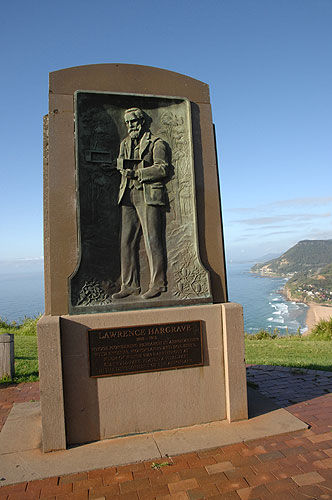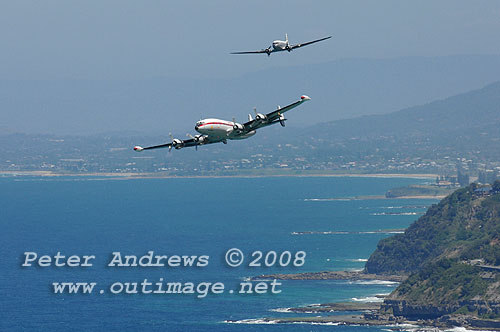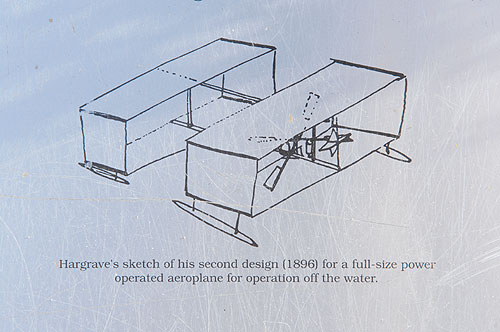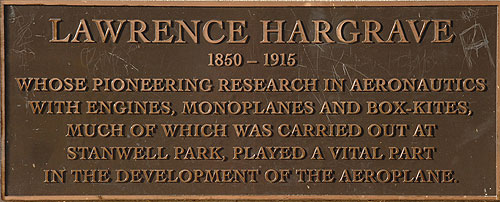


Festival of Flight for Lawrence Hargrave

Bald Hill above Stanwell Park, NSW Australia.

 |
||
Many around the world
may think that it was the Wright Brothers who in December 1903, were
the first to fly. Technically, the Wright Brothers were the first to
fly a device that was powered by engines and had a form of steering
control. But what was it that influenced the overall design of the
airframe that accommodated the engines that got them off the ground
from a beach at Kittyhawk? Nine years earlier at on the beach of Stanwell Park, New South Wales Australia, Lawrence Hargrave sat in a sling seat attached to four of his box kites, all linked in a single string. It was the 12th of November 1894 and at that time of year, there was most likely a fresh and consistent onshore north-easterly sea breeze blowing in from the South Pacific Ocean. Anchored to the ground with piano wire, the kites were launched and Hargrave was lifted and flew at a reported 16 feet above the ground. |
||
 |
||
|
||
 |
||
One hundred and fourteen years after Hargrave’s first flight, over 1,000 school children celebrated Hargrave’s achievements on Stanwell Park Beach. Like Hargrave, they flew kites in the stiff north-easterly sea breeze with many flying their own versions of Hargrave’s box kites. To complement the annual Festival of Flight celebration, the Illawarra based Historical Aircraft Restoration Society's (HARS) provided a flyover with two of their much treasured fully operational aircraft. The society's Lockheed Super Constellation, affectionately known as Connie, flew up along the Illawarra coast to Stanwell Park from the Albion Park base. With Connie, the society's Douglas C47 Dakota A65-94 flew in formation close behind. |
||
 |
||
|
||
 |
||
Returning to the Wright Brothers, they had access to Hargrave’s earlier work that was widely published at the time, including an entire section devoted to Hargrave’s work in a book published by the French-born American railroad engineer and aviation pioneer Octave Chanute. Chanute was known to have provided the Wright brothers with much help and advice in their quest to get off the ground. But Chanute also wrote in 1893 that "If there be one man more than another who deserves to succeed in flying, that man is Mister Lawrence Hargrave of Sydney, New South Wales. He has now constructed with his own hands no less than 18 flying machines of increasing size, all of which fly, and as a result of his many experiments." And as to the steering control mentioned above, one reference examined had claimed that this was another Wright Brothers initiative. Does boat rudder science ring any bells? It seems that the concept is still used today on the A380 and has been around for quite a long time before the Wright Brothers. |
||
 |
||
|
||
 |
||
Monash University’s
Centre for Telecommunications and Information Engineering’s web archive
provides many historical and documented references to the design influences
to the famous Wright Brothers aircraft. But sadly, the Wright Brothers
had denied that any of their work was influenced by Hargrave. And examining
the content of the Wikipedia version of the Wright brothers, it seems
that little has really changed. |
||
 |
||
|
||
 |
||
The flyover was sponsored by the local newspaper, the Illawarra
Mercury and their article titled Festival's big take-off has links to a gallery that provides many images of the celebrations down on the beach as well as some from onboard Connie. Other links and references about Hargrave can be found at the bottom of this page. |
||
 |

Pictorial Pages of the HARS Flight


|
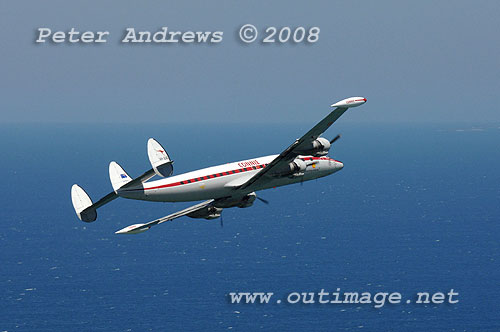 |


Lawrence Hargrave, Australian aviation pioneer (1850-1915):
http://www.ctie.monash.edu.au/hargrave/hargrave.html
Hargrave, Lawrence (1850 - 1915) Biographical Entry - Australian Dictionary of Biography:
http://adbonline.anu.edu.au/biogs/A090194b.htm
Wright Brothers account from Wikipedia:
http://en.wikipedia.org/wiki/Wright_brothers
http://www.ctie.monash.edu.au/hargrave/hargrave.html
Hargrave, Lawrence (1850 - 1915) Biographical Entry - Australian Dictionary of Biography:
http://adbonline.anu.edu.au/biogs/A090194b.htm
Wright Brothers account from Wikipedia:
http://en.wikipedia.org/wiki/Wright_brothers




|
||||||||||||
 |
||||||||||||
 |
||||||||||||
